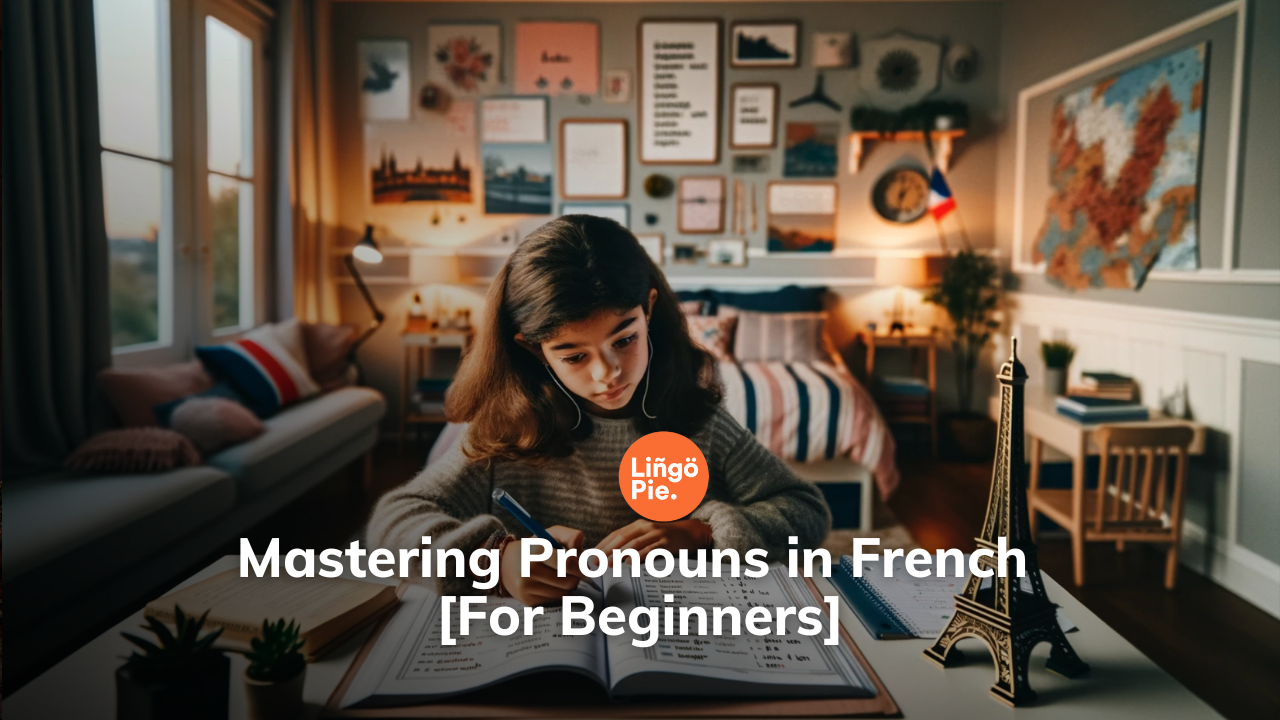A while back, I was an ordinary French student with big dreams. I was incredibly lucky to be offered a scholarship for a study abroad program in Paris, the city I had long dreamed of living in.
I had been studying French for years. I attended weekly classes with incredible teachers, watched original French films in the few cinemas my city offered, and had even ventured into reading a few novels.
But all those years of hard study didn't prepare me for the initial shock I experienced when I first stepped into the Denfert Rochereau train station (yes, a very hard-to-pronounce word!). In the first few days, I found myself wallowing in self-pity as I lamented that I couldn't understand the Parisians. Locals were encouraging, saying they were impressed by my level, but it took weeks to adjust.
Overall, it was an incredible life experience and taught me valuable lessons on language learning that I could have never learned in the classroom. Let’s take a look at some of tips for learning French the real way:

The Real Life French You Learn in Textbooks is not the One People Use

When you first start learning French from textbooks, you are introduced to a formal, structured version of the language. Textbooks provide a foundation of grammar, vocabulary, and standard phrases that are essential for understanding and constructing sentences correctly. However, the French used in real-life conversations often differs significantly from textbook French.
Of course, that dialogue in a restaurant you acted out in middle school with your best friend is going to come in handy when you step into a bistrot, but when you engage in conversation with locals, you will learn a lot of vocabulary you have never heard before.
In everyday interactions, French speakers use colloquial expressions, French slang, and idiomatic phrases that rarely appear in textbooks. This is partly because language is always evolving and it’s not easy to keep up with the pace, especially if you have learned French in your home country. I remember when I was invited to a party and referred to it as the boum, thinking it was a modern way to say ‘party’ only to find it was a very outdated word.
The pronunciation can also be more relaxed, with syllables often shortened or blended together. Moreover, the conversational rhythm and cultural references embedded in casual French speech can be challenging for learners who have only encountered the formal version of the language. This discrepancy can be confusing and overwhelming for new learners when they first engage with native speakers.
While textbooks are invaluable for building a solid linguistic foundation, immersing oneself in authentic French through media, conversations, and cultural experiences is crucial for achieving fluency and truly understanding how French is spoken in everyday life.
Before we move on, why not sign up for a Lingopie free trial to learn conversational French? Access our catalogue of French films, TV shows and documentaries and experience real life vocabulary.
You Think You Understand French Until You Set A Foot in Paris

I had been living in Paris for nearly a year when a friend of mine came to Paris for a work study program. We had both learned French in the same class in high school, but after going to university she pretty much stopped learning French. It was a great shock for her trying to have a phone conversation with her landlady-to-be. She broke off the conversation, turned around to me and said: “She just finished by saying something about a petit suisse, how strange!” For a Spanish listener, what she thought was a petit suisse turned out to be the expression “à tout de suite” (see you in a bit).
For any foreign speaker, French people “eat” words. In fact, elision - omission of one or more sounds in a word or phrase- is common in most languages and any advanced learner will want to master it to sound more natural.
Here’s a few examples:
Pas de problème (No problem) - pad problem
Qu’est-ce que tu fais ? (What are you doing?) - Kess tu fay
A toute à l’heure ! (See you later!) - a tout
Fortunately, it's a case of getting used to it. Parisians shorten words to the extreme, but with a fine ear you will get to talk like them in no time!
Get the Formality and Politeness Right

Coming from Spain, it took some time to get used to formality in France. In general, you should use the formal vous (you) everywhere: when you're talking to strangers, authority figures, work colleagues, older people, or groups of people.
In English both forms are you, so bare in mind that vous is going to be the norm for anyone you have just met: a waiter in a café, the person behind the counter when you go to open a bank account, that work meeting and, yes, very important, in-laws !
Tu is the pronoun you'd use for someone you know fairly well, like a friend or family member. Unlike Spain, you wouldn't use tu with an acquaintance, or someone you've just met.
Read Also:

French Humour
One of the delightful aspects of living in Paris is experiencing the local humor. Once I started socializing with locals, humor was part of every evening and dining conversation. Although stereotypes say otherwise, the French are extremely humorous and witty. However, you need to dive into it. I remember sitting in bars and people around me cracking up with jokes that wouldn’t be acceptable in Spain. French humor, particularly Parisian humor, has its own unique characteristics that set it apart from humor in other cultures.
French humor often relies heavily on wit and wordplay. They love playing with words, using puns, double entendres, and clever twists of phrases. This type of humor can be challenging for non-native speakers because it often involves subtle nuances and a deep understanding of the language.
French people also appreciate dark humor, which often deals with serious or taboo subjects in a light-hearted way. This type of humor can be shocking to some, but it’s a way to cope with life’s difficulties through laughter.
Master Small Talk and It Will Take You Far
In French, making small talk is called ‘parler de la pluie et du beau temps’. Indeed, it was quite amusing for me to find out that Parisians talk about the weather all the time (ironically, Paris is grey and dark for the most part of the year!). In France, before getting down to business, you first make a bit of small talk. It usually doesn’t last more than a couple of minutes, but it’s a polite way to ensure that you come across as congenial, especially when you show interest in the other person. Here are some useful phrases:
Vous avez fait bon voyage ? (How was your trip?)
Vous avez trouvé facilement ? (Could you find it easily?)
Vous connaissez déjà Paris ? (Do you already know Paris?)
Il fait beau, aujourd’hui ! (The weather’s good today!)
Most importantly, avoid overly personal topics like income, religion, or politics unless you know the person well.
Final words
Living in Paris has provided invaluable lessons about learning conversational French that go far beyond what any textbook can teach. This immersive experience highlights the importance of adapting to local speech patterns, understanding the nuanced humor, and mastering the subtle art of small talk.
Embracing these cultural aspects and linguistic nuances not only improves your French but also enriches your overall experience in Paris. As you continue your journey in learning French, remember that textbooks are just the beginning. Real fluency and understanding come from immersing yourself in the language and culture. Bon courage et bonne chance!
Learn Real French with Lingopie!
If you’re eager to move beyond textbook French and immerse yourself in the authentic language as it’s spoken by native speakers, Lingopie is the perfect tool for you! Lingopie offers a vast library of French films, TV shows, and documentaries that allow you to experience the richness and diversity of real-life French. With interactive subtitles and language-learning features, you can easily pick up colloquial expressions, slang, and idiomatic phrases that are rarely covered in traditional language courses.
Additionally, Lingopie helps you improve your listening skills and comprehension by exposing you to various accents and speaking styles. Whether you're a beginner or looking to refine your fluency, Lingopie makes learning French engaging, practical, and fun!
Sign up for a free trial today!








